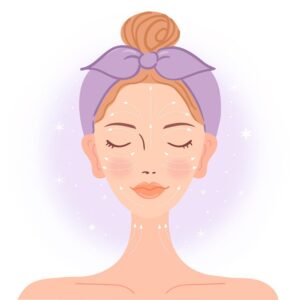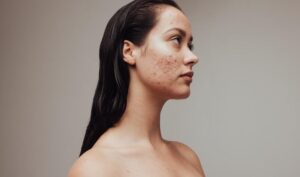Introduction to Acne
What is Acne?
Acne is a common skin condition that affects millions of people worldwide. It occurs when hair follicles become clogged with oil and dead skin cells, leading to the development of pimples, blackheads, whiteheads, and cysts. While acne is often associated with adolescence, it can affect individuals of all ages. The condition is primarily driven by hormonal changes, but factors such as diet, stress, and lifestyle also play significant roles in its development.
Acne can appear on various parts of the body, but it is most commonly found on the face, neck, chest, back, and shoulders. The severity of acne can range from mild to severe, with severe cases often leading to permanent scarring and significant emotional distress.
Types of Acne
Acne can manifest in different forms, each with its unique characteristics:
- Blackheads: Open clogged pores that turn black due to oxidation.
- Whiteheads: Closed clogged pores that remain beneath the skin.
- Papules: Small, red, tender bumps.
- Pustules: Pimples that contain pus at the top.
- Nodules: Large, solid lumps beneath the skin, which can be painful.
- Cysts: Deep, pus-filled lesions that often lead to scarring.
Understanding the type of acne, you are dealing with is essential for determining the most effective acne treatment.

Importance of Acne Treatment
Why Treating Acne is Essential?
For many, acne may seem like a superficial issue, but in reality, acne treatment is crucial for several reasons:
- Prevention of Scarring
Untreated acne can lead to permanent scars. Severe acne, especially nodules and cysts, often leave behind deep scars that are difficult to treat later. Early and effective treatment helps in reducing the risk of such scarring. - Boosting Self-Confidence
Acne can have a significant impact on a person’s self-esteem. Many people feel embarrassed or self-conscious about their appearance due to the visible marks on their skin. Timely treatment helps in improving skin appearance, leading to greater self-confidence. - Avoiding Skin Inflammation and Hyperpigmentation
Without proper care, acne can lead to inflammation, causing dark spots and patches on the skin known as post-inflammatory hyperpigmentation. By treating acne early, you can prevent long-term skin discoloration. - Managing Pain and Discomfort
Severe acne, such as cystic acne, can be painful. These deep lesions cause inflammation and swelling, leading to discomfort. Treating acne helps alleviate pain and allows the skin to heal faster.
How to Choose the Right Acne Treatment?
Choosing the right acne treatment depends on various factors, including the type of acne you have, your skin type, and the underlying causes. Treatments can range from over-the-counter solutions to prescription medications and lifestyle changes.
Acne Treatment Options
Over-the-counter (OTC) Acne Treatments
OTC products are often the first line of defense against mild to moderate acne. These products are available without a prescription and can effectively target acne-causing bacteria, excess oil production, and clogged pores.
- Salicylic Acid
Salicylic acid is a common ingredient in many acne treatment products. It works by exfoliating the skin and unclogging pores. It is particularly effective for treating blackheads and whiteheads. - Benzoyl Peroxide
Benzoyl peroxide is a powerful antibacterial agent that kills Propionibacterium acnes, the bacteria responsible for causing acne. It is also effective in reducing inflammation and preventing new acne breakouts. - Retinoids
Retinoids, derived from vitamin A, are known for their ability to promote cell turnover. By encouraging the shedding of dead skin cells, retinoids prevent clogged pores and treat both acne and acne scars. - Sulfur
Sulfur is a gentle ingredient that helps dry out the surface of the skin to absorb excess oil. It is particularly effective for people with oily skin types who suffer from mild breakouts.
Prescription Acne Treatments
For moderate to severe acne, prescription treatments are often required. These treatments are stronger and provide faster results, but they should be used under medical supervision.
- Oral Antibiotics
Oral antibiotics are used to treat acne by reducing inflammation and killing acne-causing bacteria. They are usually prescribed for short-term use to control severe breakouts. - Topical Antibiotics
Topical antibiotics, such as clindamycin and erythromycin, are applied directly to the skin to reduce bacterial growth. These medications are often combined with other acne treatments for better results. - Hormonal Therapy
For women, hormonal imbalances can trigger acne. Hormonal treatments, such as birth control pills or anti-androgens like spironolactone, help regulate hormone levels and reduce acne outbreaks. - Isotretinoin (Accutane)
Isotretinoin is a potent medication used for severe cystic acne that has not responded to other treatments. It works by shrinking the oil glands in the skin and preventing them from becoming clogged. Due to its strong effects, it is prescribed with caution.
Effective Acne Treatment Options at Pristine Cosmesis
At Pristine Cosmesis, we provide a variety of tailored acne treatments designed to target different skin needs:
- Topical Treatments: Medications like retinoids, benzoyl peroxide, or antibiotics reduce inflammation and control bacteria.
- Oral Medications: Antibiotics such as doxycycline or minocycline are prescribed for moderate to severe cases to decrease bacteria and inflammation.
- Laser and Light Therapies: These therapies reduce acne-causing bacteria and inflammation effectively through targeted treatment.
- Chemical Peels: Peels with salicylic or glycolic acid unclog pores and enhance skin texture.
- Extraction: Dermatologists manually remove blackheads and whiteheads to clear up blemishes quickly.
- Lifestyle and Skincare Changes: Proper skincare routines and dietary advice complement medical treatments for long-term skin health.

Preventing Future Acne Breakouts
Treating acne is important, but preventing future breakouts is equally crucial. Here are some essential tips to prevent acne:
- Maintain a Proper Skincare Routine
A consistent skincare routine is vital for preventing acne. Use a gentle cleanser to remove dirt and oil twice a day, followed by a non-comedogenic moisturizer. Avoid scrubbing your skin harshly, as it can irritate the skin and lead to more breakouts. - Avoid Touching Your Face
Touching your face transfers dirt, oil, and bacteria from your hands to your skin, potentially clogging your pores and causing acne. Keep your hands off your face to minimize the risk of breakouts. - Watch Your Diet
Certain foods, such as those high in sugar and dairy, have been linked to acne breakouts. Maintaining a balanced diet rich in fruits, vegetables, and whole grains can help improve your skin’s health and reduce the risk of acne. - Stay Hydrated
Drinking plenty of water throughout the day helps keep your skin hydrated and flushes out toxins from the body. Proper hydration can prevent excess oil production and minimize the likelihood of clogged pores. - Manage Stress
Stress is known to trigger acne by increasing hormone production. Engage in stress-reducing activities such as meditation, yoga, or exercise to keep your mind and skin healthy.
Conclusion
Acne is a frustrating condition, but with the right acne treatment and preventive measures, it can be managed effectively. From over-the-counter products to prescription medications and natural remedies, there are numerous options available to help you achieve clear, healthy skin. Addressing the root causes of acne, maintaining a consistent skincare routine, and making lifestyle adjustments can significantly reduce the severity and frequency of acne breakouts.
